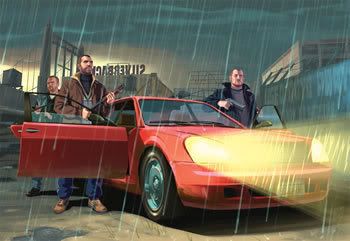This is a post in a series expressing the essence of my argument about how video games are actually ancient, how they reawaken the anicent oral epic tradition represented above all by the epics of the Homeric tradition, the Iliad
and the Odyssey
. The earlier posts can be found through the “Living Epic—the Main Quest” link on the right. Note that this blog is aimed at an audience that includes non-gamers; I apologize for boring the gamers in my audience by going over such things as the basics of game genres, but I hope they might want to see that as an opportunity to share my posts with non-gaming parents, teachers, and spouses.
If it were actually possible in an adventure video game to do anything you want, obviously I wouldn’t really have any business comparing adventure video games to ancient epics the way I am, because, obviously, the epic singer (let alone his audience, even if that audience is the guy paying the singer) can’t tell any version of the story he wants—he can’t for example, make Odysseus give up on getting home to Ithaca. But if it turns out that in fact the interactive storytelling in adventure video games limits stories the same way ancient epic does, we’re getting somewhere: once we see those limits, we can start to talk about them, and also about the stories that lie inside them—the stories that can and do get told both in ancient epic and in video games.
One of the qualities that tends to be valued very highly in games (though because there are different styles of adventure video game, this quality isn’t something a good game has to have) is what’s often called a sandbox style, or a sandbox feel. Some games that have defined stories also even have a “sandbox mode” in which the player can do whatever he or she likes within the world of the game.
(Like every other term in the gaming lexicon, “sandbox” has been used to describe different things from time to time. I should make it clear that I’m not going to talk in this particular context about how games like “Civilization” and “Sim City,” which can be called simulations or strategy games, and some of which are called “god games,” are related to ancient epic, if they are at all. In these games, the player controls a civilization or a subset of a civilization, and may or may not be required to meet certain goals to “win” the game. The distinguishing features of the adventure video games I’m talking about are 1) playing as a hero and 2) having an adventure as that hero. As you can tell, we actually have a bit of a problem even with the word “game,” though nobody has any good ideas it seems at this point what we should say instead of “game.” I have my own ideas on the matter, and a term I like to think with, "performative play practice," but thats for another series somewhere down the road.)
The sandbox metaphor is of course an evocation of the infinite possibilities presented to a child by a sandbox. Right off the bat, it’s worth noting a big and important difference between a sandbox and a video game: the imaginary possibilities presented to a kid in a sandbox are infinite, but sandboxes don’t have stories, except to whatever extent a kid brings them in with him or her.
To put it in familiar gaming terms, sandboxes don’t have missions, or quests, or campaigns—again, except as a kid brings them in there and brings them to life, enacts them, in the sand. If a sandbox came with a story, kids could still choose whether to play the story, and how to play it, but if they did play that story, they’d automatically be limiting what they could do.
Likewise, there are games that allow you incredible freedom in where you can go in the game-world, but unless there’s some story, whether in the form of a series of missions or any other kind of stronger narrative, they aren’t games, or at least they tend to give people fits as they try to figure out whether to call them games or not. (Remember that the games I’m talking about in this series are the ones I’m calling adventure video games, in which the player controls a character who has an adventure.) Even if you’re not a gamer, you may have heard of
Second Life, which has acquired a bit of notoriety for the strange things that happen there.
Second Life is an example of a persistent world: it presents like a game in every way except that there’s no story. Because it doesn’t impose a story, even in the form of a particular kind of avatar,
Second Life couldn’t be called an adventure video game.
On the other hand, another good example is Disney’s persistent-world offering,
Club Penguin. In
Club Penguin, kids control penguins and play a wide variety of minigames to earn virtual coins, with with they can purchase upgrades to their igloos. While
Second Life can’t be called an adventure game,
Club Penguin could be, since the player’s experience is fundamentally configured as the story of an upwardly mobile penguin. The player may also get a job as a secret agent for some traditional adventure game storytelling, but the fundamental experience is of being a penguin in the world of
Club Penguin. It’s the limitation that makes for the story. You can do almost anything in
Club Penguin except not be a penguin with earning potential, just as (I’ll show as I proceed) you can do almost anything in
Grand Theft Auto except not be a character who jacks cars.
Having a story thus by nature limits what a player can do, just as having a story limits what an epic singer can do, and where he can take his audience in his song.
There’s a term for this limitation, too, in gaming circles: “rails.” When a game is “on rails,” the player has to go in a pre-determined course, like a train on its track. A game “on rails” is thus roughly the opposite of a “sandbox” game. When you think about it, every adventure video game can be described as having a ratio of sandbox-to-rails, because at the ends of the sandbox—rails spectrum a video game ceases to be a game and becomes something else: a virtual world at the sandbox end, an animated video at the rails end.





